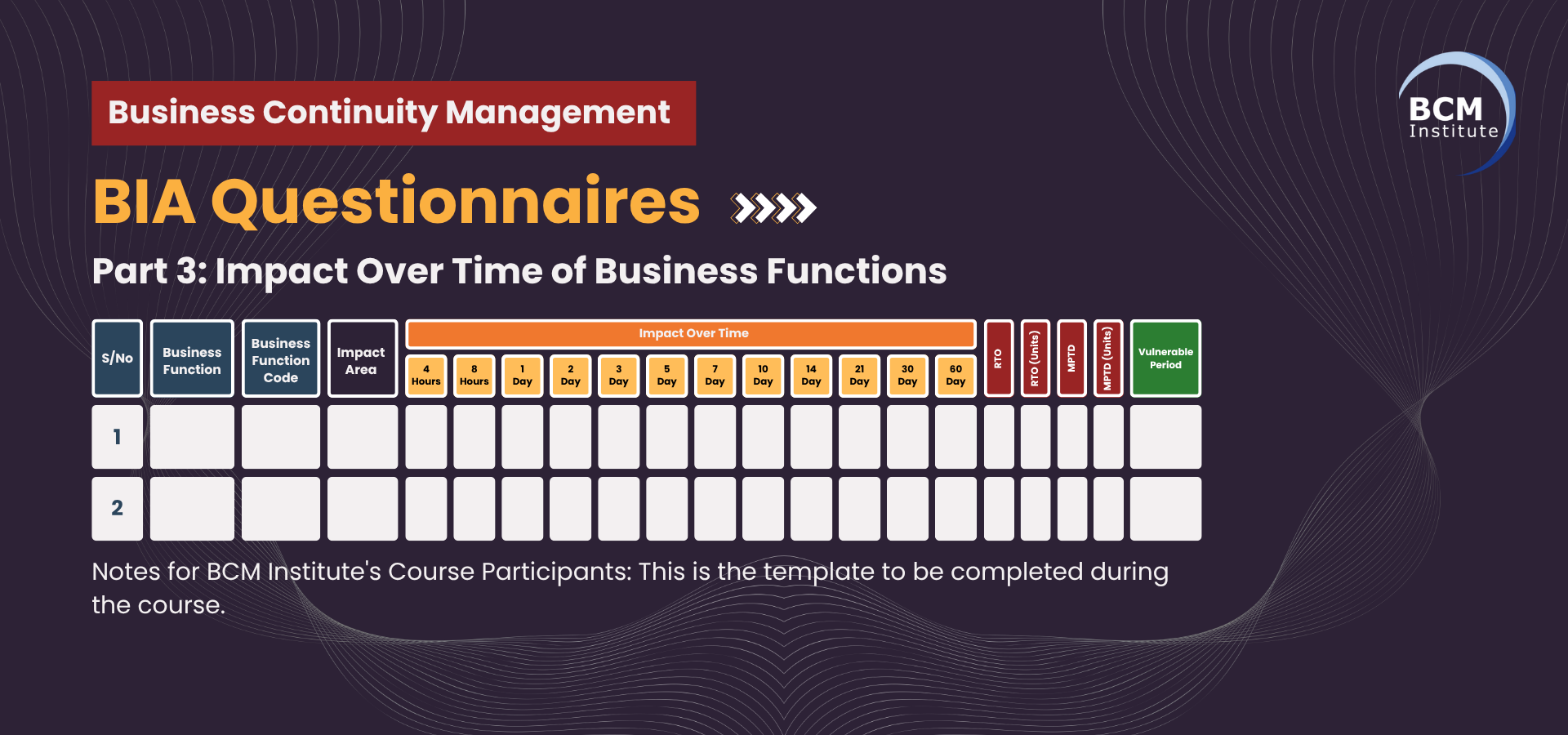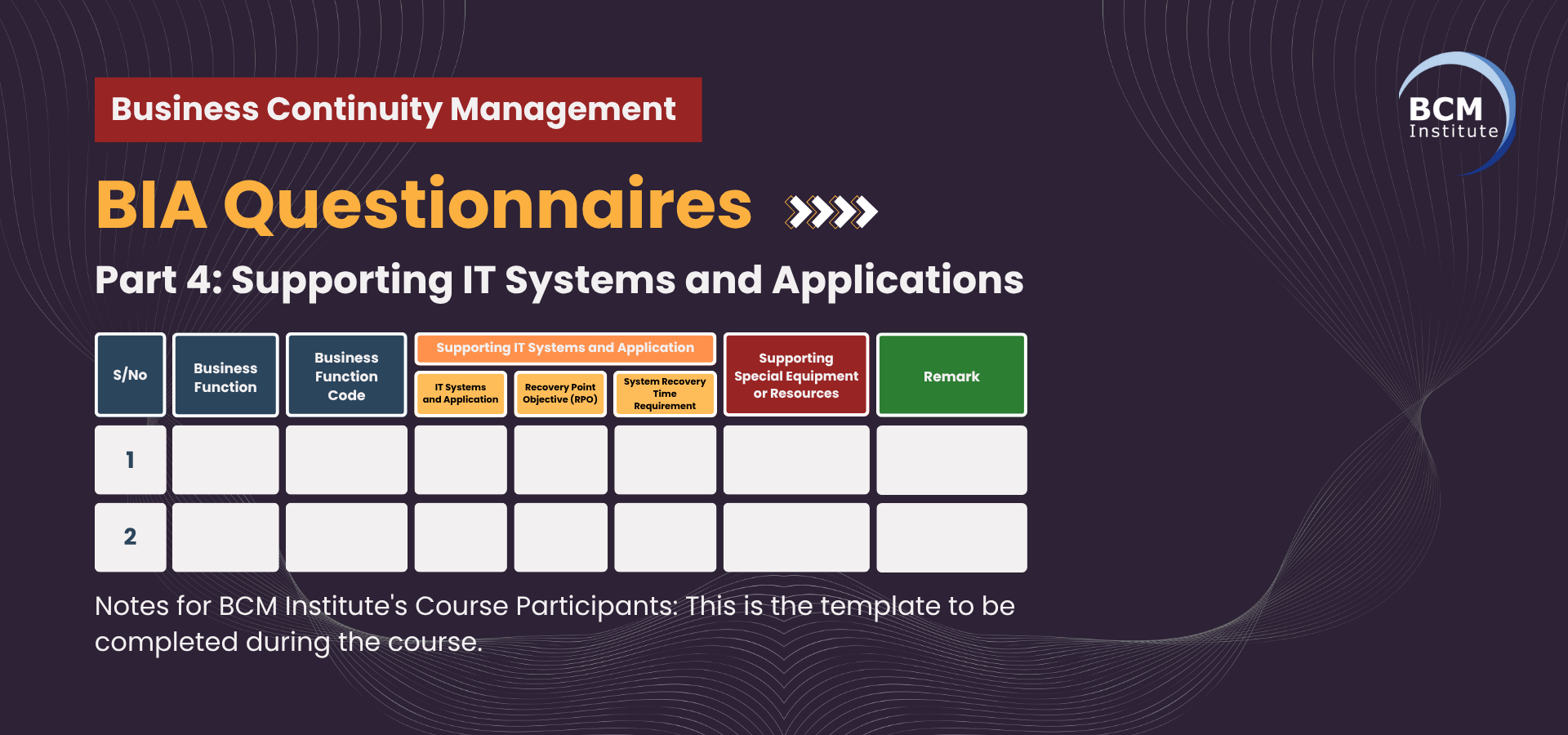[Business Impact Analysis] [Critical Business Function] [T2] Part 3
BIA Questionnaires
Part 3: Impact Over Time of Business Functions
CBF-1 Project Design and Engineering Services
![[BCM] [SJ] [E3] [BIA] [T2] [CBF] [1] Job Matching and Career Services](https://no-cache.hubspot.com/cta/default/3893111/3a138ac8-44b3-4d72-a619-741c8bd7a252.png) CBF-1 Project Design and Engineering Services over time. As a core business function, Project Design and Engineering Services form the foundation of Surbana Jurong’s ability to deliver value to clients, maintain contractual commitments, and safeguard its reputation in the global infrastructure and urban development sectors.
CBF-1 Project Design and Engineering Services over time. As a core business function, Project Design and Engineering Services form the foundation of Surbana Jurong’s ability to deliver value to clients, maintain contractual commitments, and safeguard its reputation in the global infrastructure and urban development sectors.
By breaking down CBF-1 into its Sub-Critical Business Functions (Sub-CBFs), this assessment identifies the potential consequences of interruptions at progressive time intervals, ranging from the first four hours to 60 days.
Each Sub-CBF has been evaluated across key impact dimensions such as client relationship management, project timelines, regulatory compliance, revenue recognition, and competitive positioning.
The impact scoring follows a scale from 1 (lowest impact) to 5 (highest impact), reflecting the severity of consequences if the disruption persists.
The Recovery Time Objective (RTO) and Maximum Tolerable Period of Disruption (MTPD) are also determined for each Sub-CBF, providing clear benchmarks for recovery priorities. In addition, the vulnerable period—the point in a project cycle when a disruption would cause the most significant harm—is identified to support proactive risk management and resource allocation.
This analysis ensures that decision-makers have a clear, time-based understanding of how operational disruptions evolve and what resources must be mobilised to prevent unacceptable business impacts.
|
Sub-CBF Code |
Sub-CBF |
Highest-Impact Area |
4 Hour |
8 Hour |
1 Day |
2 Day |
3 Day |
5 Day |
7 Day |
10 Day |
14 Day |
21 Day |
30 Day |
60 Day |
Recovery Time Objective (RTO) |
Maximum Tolerable Period of Disruption (MTPD) |
Vulnerable Period |
|
1.1 |
Project intake & scope definition |
Client relationship & project pipeline |
2 |
3 |
4 |
4 |
5 |
5 |
5 |
5 |
5 |
5 |
5 |
5 |
5 |
2 days |
7 days |
|
1.2 |
Conceptual design & cost estimating |
Proposal competitiveness & bidding success |
2 |
3 |
4 |
5 |
5 |
5 |
5 |
5 |
5 |
5 |
5 |
5 |
5 |
2 days |
7 days |
|
1.3 |
Multidisciplinary design engineering |
Compliance, delivery timelines, & revenue recognition |
3 |
4 |
4 |
5 |
5 |
5 |
5 |
5 |
5 |
5 |
5 |
5 |
5 |
3 days |
10 days |
|
1.4 |
Virtual coordination (VDC/CAVE) |
Team productivity & inter-disciplinary alignment |
2 |
3 |
4 |
4 |
5 |
5 |
5 |
5 |
5 |
5 |
5 |
5 |
5 |
2 days |
7 days |
|
1.5 |
Digital delivery & QA compliance |
Regulatory compliance & client satisfaction |
3 |
4 |
5 |
5 |
5 |
5 |
5 |
5 |
5 |
5 |
5 |
5 |
5 |
1 day |
5 days |
|
1.6 |
Handover & asset ops readiness |
Client acceptance & contractual closure |
3 |
4 |
4 |
5 |
5 |
5 |
5 |
5 |
5 |
5 |
5 |
5 |
5 |
2 days |
7 days |
|
1.7 |
Post-delivery support |
Client service continuity & warranty obligations |
2 |
3 |
4 |
4 |
4 |
4 |
5 |
5 |
5 |
5 |
5 |
5 |
5 |
5 days |
14 days |
|
1.8 |
Innovation & continuous improvement |
Competitive edge & service quality |
1 |
1 |
2 |
2 |
3 |
3 |
3 |
4 |
4 |
4 |
4 |
4 |
5 |
30 days |
60 days |
Summing Up... Part 3
The time-based impact analysis of CBF-1 Project Design and Engineering Services demonstrates that even short-term interruptions can cause significant operational, financial, and reputational consequences for Surbana Jurong, particularly during high-dependency project phases such as conceptual design and cost estimating, digital delivery, and handover readiness.
While some Sub-CBFs can tolerate more extended outages before severe impacts are felt, others require immediate recovery efforts within 1–3 days to avoid contractual breaches, client dissatisfaction, or project delays.
Understanding the impact progression over time allows Surbana Jurong to prioritise recovery activities, allocate resources efficiently, and plan mitigation strategies for its most time-sensitive operations.
The inclusion of RTOs, MTPDs, and vulnerable periods provides a structured basis for developing targeted business continuity strategies that address both immediate operational needs and long-term organisational resilience.
Ultimately, this impact-over-time assessment strengthens Surbana Jurong’s ability to maintain project delivery excellence, uphold client trust, and safeguard its competitive advantage in the global market—even in the face of unexpected disruptions.
[Business Impact Analysis] [Critical Business Function] [T2] Part 4
BIA Questionnaires
Part 4: Supporting IT Systems and Applications
CBF-1 Project Design and Engineering Services
The effective delivery of Project Design and Engineering Services at Surbana Jurong (SJ) relies heavily on a suite of advanced IT systems and applications that support each critical business function (CBF) within the project lifecycle.
These digital tools and platforms enable efficient project intake, comprehensive design coordination, quality assurance, and seamless handover processes, ensuring that client requirements are met with precision and timeliness.
This chapter outlines the key IT systems, applications, and specialised resources supporting each sub-CBF of CBF 1, highlighting their recovery priorities and operational readiness.
Understanding the technological backbone behind these services is essential for maintaining resilience, minimising downtime, and driving continuous innovation within SJ’s project delivery framework.
Part 4: Supporting IT Systems and Applications
|
Sub-CBF Code |
Sub-CBF |
IT Systems and Applications |
RPO |
System RTO |
Supporting Special Equipment or Resources |
Remarks |
|
1.1 |
Project intake & scope definition |
Project Management System (e.g., Oracle Primavera, MS Project), CRM System, Document Management System (DMS) |
4 hrs |
8 hrs |
Secure project data servers, client onboarding portal |
Ensures accurate project initiation and scope capture |
|
1.2 |
Conceptual design & cost estimating |
BIM Software (e.g., Autodesk Revit, Civil 3D), Cost Estimating Tools, Design Repositories |
4 hrs |
8 hrs |
High-performance CAD workstations, licensed BIM plugins |
Critical for early project feasibility and budgeting |
|
1.3 |
Multi-disciplinary design engineering |
Integrated Design Suite (e.g., AutoCAD, MicroStation, Tekla), Structural & MEP Analysis Software |
4 hrs |
8 hrs |
Engineering workstations, collaboration servers |
Supports coordination between multiple engineering disciplines |
|
1.4 |
Virtual coordination (VDC/ CAVE) |
Virtual Design & Construction (VDC) Platforms, 3D Model Review Tools (e.g., Navisworks), VR/AR Software |
4 hrs |
8 hrs |
CAVE (Cave Automatic Virtual Environment) hardware, VR headsets |
Enables immersive coordination sessions with stakeholders |
|
1.5 |
Digital delivery & QA compliance |
Digital Handover Platforms, Quality Management Systems (QMS), Compliance Check Software |
4 hrs |
8 hrs |
Secure data transfer servers, compliance validation devices |
Maintains quality and regulatory compliance during delivery |
|
1.6 |
Handover & asset ops readiness |
Asset Management Software (e.g., IBM Maximo), Facilities Management Systems, Digital Twin Platforms |
4 hrs |
8 hrs |
Secure asset data repositories, integration middleware |
Supports smooth transition to the operations phase |
|
1.7 |
Post-delivery support |
Customer Support Ticketing System, Remote Diagnostics Tools, Maintenance Scheduling Software |
4 hrs |
8 hrs |
Remote access servers, diagnostic kits |
Ensures client support and system performance post-handover |
|
1.8 |
Innovation & continuous improvement |
R&D Collaboration Tools, Knowledge Management Systems, Data Analytics Platforms |
4 hrs |
8 hrs |
High-performance computing servers, AI/ML tools |
Facilitates ongoing process improvements and innovation |
Summing Up ... for Part 4
The supporting IT systems and applications detailed in this chapter form the foundation upon which Surbana Jurong’s Project Design and Engineering Services operate efficiently and resiliently.
From project initiation to post-delivery support and continuous improvement, each sub-CBF depends on dedicated digital platforms and specialised equipment to fulfil its objectives.
By clearly defining recovery point objectives (RPO), recovery time objectives (RTO), and resource requirements, SJ ensures that these critical technological assets remain robust and responsive in the face of disruptions.
Maintaining and evolving this IT infrastructure is pivotal to sustaining high-quality service delivery, safeguarding project data integrity, and fostering innovation across all stages of the engineering project lifecycle.
More Information About Business Continuity Management Courses

 To learn more about the course and schedule, click the buttons below for the BCM-300 Business Continuity Management Implementer [B-3] course and the BCM-5000 Business Continuity Management Expert Implementer [B-5].
To learn more about the course and schedule, click the buttons below for the BCM-300 Business Continuity Management Implementer [B-3] course and the BCM-5000 Business Continuity Management Expert Implementer [B-5].
![Register [BL-B-3]*](https://no-cache.hubspot.com/cta/default/3893111/ac6cf073-4cdd-4541-91ed-889f731d5076.png) |
 |
 |
 |
 |
 |
![FAQ [BL-B-3]](https://no-cache.hubspot.com/cta/default/3893111/b3824ba1-7aa1-4eb6-bef8-94f57121c5ae.png) |
If you have any questions, click to contact us.
|
 |
 |
 |
 |








![[BCM] [SJ] [E3] [BIA] MBCO Corporate MBCO](https://no-cache.hubspot.com/cta/default/3893111/24c05d3a-b149-4ca8-98e7-502110252314.png)
![[BCM] [SJ] [BIA] [P&S] Key Product and Services](https://no-cache.hubspot.com/cta/default/3893111/47c328b1-d3ec-4f9f-be8b-daf100414ee0.png)
![[BCM] [SJ] [E3] [RAR] [T1] List of Threats](https://no-cache.hubspot.com/cta/default/3893111/9af21487-e3ba-45a9-8eab-daba82e83ad4.png)
![[BCM] [SJ] [E3] [RAR] [T2] Treatment and Control](https://no-cache.hubspot.com/cta/default/3893111/0339c379-e3c2-41db-bc1f-1e3b9cb0032b.png)
![[BCM] [SJ] [E3] [RAR] [T3] Risk Impact and Likelihood Assessment](https://no-cache.hubspot.com/cta/default/3893111/5c74de4b-6175-489f-b8ae-391054679e44.png)
![[BCM] [SJ] [E3] [BCS] [T1] Mitigation Strategies and Justification](https://no-cache.hubspot.com/cta/default/3893111/a14be3e6-40db-483e-98b0-0d3aab89c255.png)
![[BCM] [SJ] [E1] [C10] Identifying Critical Business Functions](https://no-cache.hubspot.com/cta/default/3893111/9b78c18e-0123-4ad1-a166-d4e10e688703.png)
![[BCM] [SJ] [E3] [BIA] [DP] [CBF] [1] Project Design and Engineering Services](https://no-cache.hubspot.com/cta/default/3893111/4b1be737-b29a-4b03-8783-0b41e9348916.png)
![[BCM] [SJ] [E3] [BIA] [T1] [CBF] [1] Project Design and Engineering Services](https://no-cache.hubspot.com/cta/default/3893111/638e6794-72ee-4ba8-bc50-76fa3d828437.png)
![[BCM] [SJ] [E3] [BIA] [T3] [CBF] [1] Project Design and Engineering Services](https://no-cache.hubspot.com/cta/default/3893111/e8d09a1d-b9c2-4bfc-a58e-3da5940212e2.png)
![[BCM] [SJ] [E3] [BCS] [T2] [CBF] [1] Recovery Strategies](https://no-cache.hubspot.com/cta/default/3893111/fead7f44-b21b-40cd-a2e5-52ce716c39d5.png)
![[BCM] [SJ [E3] [BCS] [T3] [CBF] [1] Minimum Resources Required during a Disaster](https://no-cache.hubspot.com/cta/default/3893111/17287efc-9c3a-4e36-b5ff-1c5fdcf78762.png)
![[BCM] [SJ] [E3] [PD] [CBF] [1] Project Design and Engineering Services](https://no-cache.hubspot.com/cta/default/3893111/e6dde8d8-1404-4fb7-9c0c-fc70e101040b.png)
![Email to Sales Team [BCM Institute]](https://no-cache.hubspot.com/cta/default/3893111/3c53daeb-2836-4843-b0e0-645baee2ab9e.png)

